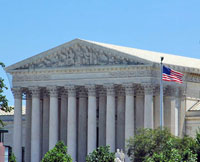Waiting for DOMA and Prop 8
 The U.S. Supreme Court will release decisions any day now in two high-profile cases involving marriage and same-sex couples. Historically, the court has favored releasing its most controversial decisions on the last day of its October through June session. And in past years, the court released four of its last six gay-related decisions on the last day of the session.
The U.S. Supreme Court will release decisions any day now in two high-profile cases involving marriage and same-sex couples. Historically, the court has favored releasing its most controversial decisions on the last day of its October through June session. And in past years, the court released four of its last six gay-related decisions on the last day of the session.
While most mainstream media are reporting on the cases as if the court will decide whether gay couples can get married, the stakes are really much higher for LGBT people. The bottom line issue in both cases is whether gay people can have equal protection under the law. Whatever the court rules, it will have enormous impact on the legal and political well-being of LGBT people in every arena for decades to come.
One opinion will concern California’s Proposition 8 – an amendment to the state constitution, approved by voters in 2008, to prohibit the state from issuing or recognizing as valid a marriage license for a same-sex couple. The case is Hollingsworth v. Perry.
The second opinion, U.S. v. Windsor, asks whether the federal Defense of Marriage Act (DOMA) is constitutional.
Most experts predict that, if the court can clamber over some procedural obstacles to both cases, it will strike down both Proposition 8 and DOMA. But there are many variations on how all this might play out.
For instance, in the Prop 8 case, it’s possible, notes veteran lesbian law activist Nan Hunter (at hunterofjustice.com), that the court will find that Yes on 8 has standing but that the court doesn’t want to issue an opinion on the constitutionality of Prop 8. If that happened, wrote Hunter, the Ninth Circuit decision remains intact and is binding on all nine of the Ninth Circuit states.
Georgetown law professor Martin Lederman noted at least four variations of opinions that could come if Yes on 8 has standing. One of those could declare that states, like California and six others, cannot give same-sex couples civil unions and domestic partnerships in lieu of marriage. (The six other states are Colorado, Hawaii, Illinois, Nevada, New Jersey, and Oregon.)
The court could also uphold Prop 8 as constitutional, strike it as unconstitutional in all 37 states which have such bans, or strike it down only in California.
One of the more limited outcomes would likely happen if the court rules Yes on 8 proponents did not have legal standing to appeal the lower court decisions. The California Supreme Court said Yes on 8 did have standing and the Ninth Circuit U.S. Court of Appeals agreed. The Ninth seemed to agree that denying Yes on 8 the right to appeal amounted to giving state officials veto power over voter-approved initiatives, aka the “democratic process.” And key justices, including Justice Anthony Kennedy, have been publicly vocal about their preference that the “democratic process” decide hot-button controversies, not the court.
For DOMA, the court could rule on the merits of federal law’s constitutionality or it could find some procedural issue that precludes a ruling on merits. If there’s no ruling on the merits, the court could allow the Second Circuit decision against DOMA to stand. But it’s hard to imagine the court would be comfortable with allowing DOMA to be enforced in some parts of the country (where federal courts have struck it down) and not others. It’s the Supreme Court’s job, after all, to step in where there’s a conflict among the circuits and states. And if the court doesn’t rule on U.S. v. Windsor, it will almost certainly accept another DOMA case in which to examine the law’s constitutionality.
Even if the court sticks to the more limited actions, the result would be a major leap forward for marriage equality. In the Prop 8 case, just adding California to the list of states with marriage equality pushes to 30 percent the nation’s population that would be living in marriage equality states –a huge jump from the 18 percent who live in such states now.
Whatever the Supreme Court does, it will do it sometime between Monday, June 17, and Thursday, June 27, the likely last day of the session. (The court’s public information office says the last official day has not yet been decided.) And many believe the results will represent among the most important civil rights decisions in Supreme Court history. They most certainly will be among the most important in LGBT history.
“I’m hopeful the Supreme Court will do the right thing,” said Evan Wolfson, head of the national Freedom to Marry. “And clearly, the right answer under the constitution, and for the good of same-sex couples and our country, is to end the denial of freedom to marry nationwide and assure that all marriages are respected equally.”


Leave a Reply